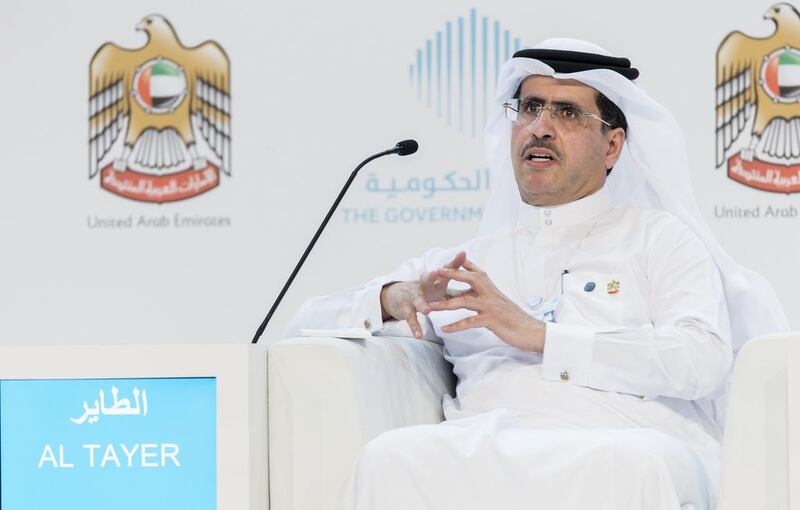DUBAI // Residents will soon be able to tell how much water and electricity they have consumed and resolve issues within seconds, according to the chief executive of Dubai’s Electricity and Water Authority (Dewa).
Saeed Al Tayer said the smart meter would offer valuable and efficient real-time information to customers.
“If you have a technical problem with your electricity, you can have someone solve it within seconds,” he said during a talk on UAE Smart Cities Outlook at the Government Summit on Wednesday. “The objective is to have real-time maintenance and problem-solving but, for now, what we want is to have rational consumption of energy.”
A communications network that connects the distribution part of service directly to the consumer is required.
“We have 120,000 meters that were linked to the network two months ago,” Mr Al Tayer said. “We need to link to modern systems and household appliances to reduce our losses in electricity transmission and distribution networks as it will preserve our environment and reduce carbon dioxide emissions. Our losses are down to 3.5 per cent, one of the best percentages worldwide, compared with 6 or 7 per cent in the US.” He said the new meter would help the company and residents by spelling out the use of energy.
“This is an important aspect,” he said. “Today, a person can know exactly his consumption and carbon footprint that is consumed and this can give him a further incentive to improve efficiency.”
Dewa is also aiming to reduce the time of interrupted water supply to customers from four minutes to two.
“The four-minute mark was an improvement on last year and a 16-minute improvement compared to the world average,” he said. “We have performance indicators, that are some of the best worldwide. Energy is the main pillar for any economy – if you don’t have a high and efficient power, electricity and energy sector, you cannot advance. So we are focusing on reducing from that number.”
He said performance was constantly measured to ensure good planning.
“We hope to ensure sustainable resources for electricity,” Mr Al Tayer said. “We have to have a diversified source of power, especially by focusing on nuclear, renewables, clean and solar energy. We cannot just depend on one source of energy.”
Dewa plans to link households to solar panel grids, which will also reduce some residents’ energy bills.
“Dewa will buy the electricity surpluses from the consumer,” he said. “So we are ready to buy this surplus of power and I think it will contribute to increasing the share of renewable energy. We saw in our studies that the price of solar energy should be competitive by 2020 and we have seen that, today, the price of solar energy is even less.”
By 2030, Dewa aims to reduce energy consumption by 30 per cent.
“There has been progress but this does not mean we will reduce demands on projects,” he said, citing one specifically that aims to rehabilitate 30,000 houses in Dubai and turn them into smart houses.
“It isn’t an easy task so we have started to create proper legislations for that.
“We also need service companies that are specialised and capable of transforming houses into smart houses, in lighting and automation of systems inside the house. Ultimately, the smart government objective is to ensure citizens’ happiness through efficiency, uninterrupted services and reliable information to improve their quality of life.”
cmalek@thenational.ae





